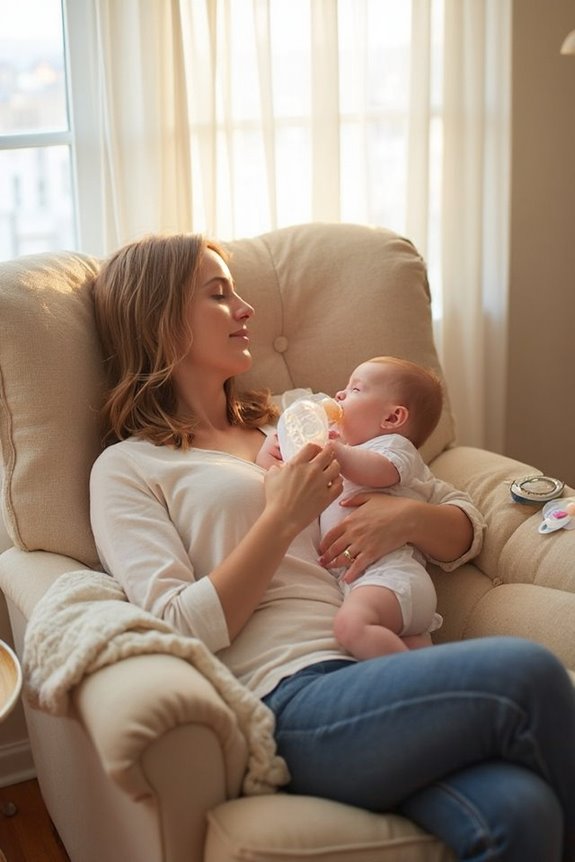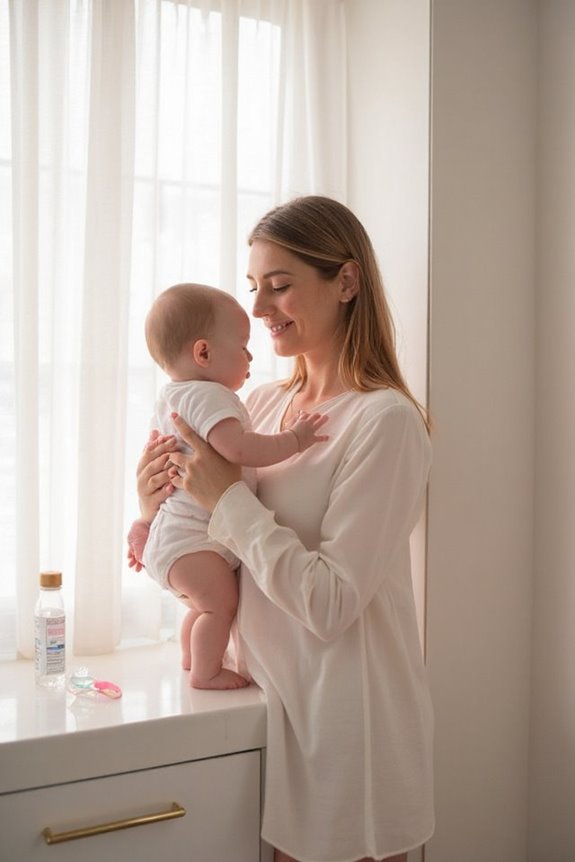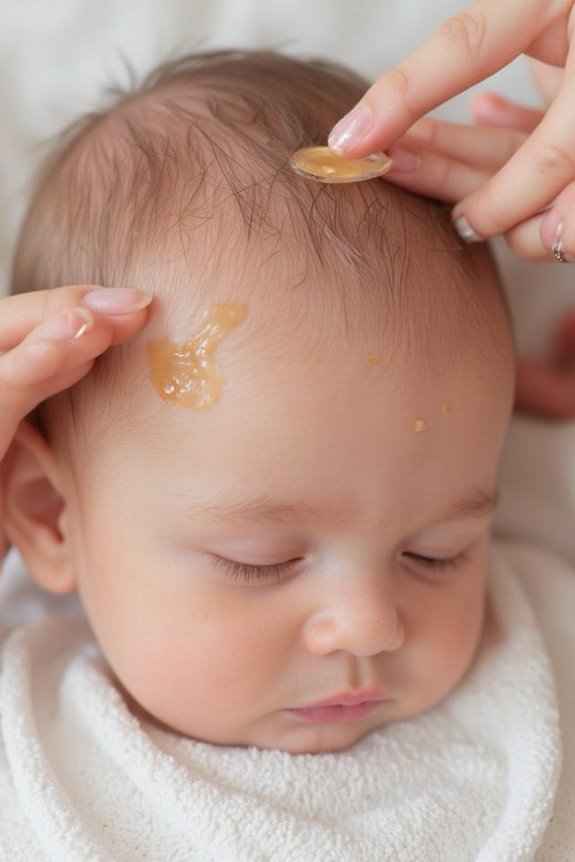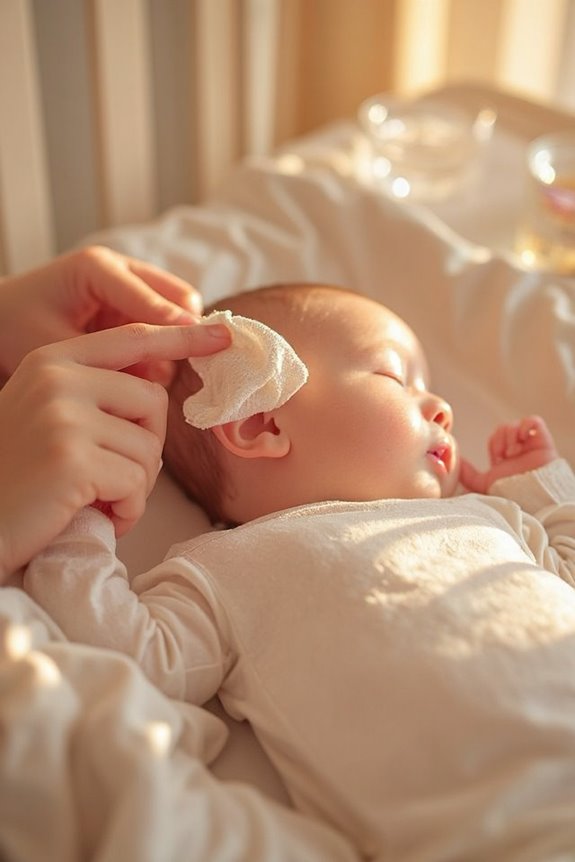Baby hiccups are typically caused by air intake during feeding or reflux. To address them, I recommend ensuring proper feeding techniques: maintain upright positions, burp frequently, and consider smaller, more frequent feedings. For bottle-fed babies, use slow-flow nipples and anti-colic bottles. While hiccups usually resolve on their own within 5-10 minutes, creating a calm feeding environment can help prevent them. If hiccups persist for hours or cause distress, consult your pediatrician. The following techniques offer more extensive solutions.
Key Takeaways
- Gently rub or pat baby’s back in an upright position to release trapped air causing hiccups.
- Feed baby more slowly and ensure proper latching or bottle angle to minimize air intake during feedings.
- Take breaks during feeding to burp baby thoroughly using over-the-shoulder or seated upright positions.
- Offer a pacifier, which can help relax the diaphragm and potentially stop hiccup episodes.
- Create a calm feeding environment with minimal distractions and maintain baby in an upright position after feeding.
Why Do Babies Get Hiccups? Understanding the Causes
While those tiny hiccup sounds from your baby might seem concerning, they’re actually a normal physiological response that almost all infants experience. Hiccups occur when your baby’s diaphragm experiences sudden, involuntary spasms, forcing air through the vocal cords.
These diaphragm spasms are often triggered by:
- Feeding-related issues (overfeeding or eating too quickly)
- Swallowing air during feeding
- Gastroesophageal reflux (GERD)
- Sudden temperature changes in the stomach
Interestingly, hiccups may serve an important purpose in your baby’s development. Research suggests these seemingly random newborn reflexes might play an essential role in brain development, particularly in helping infants learn to regulate their breathing patterns. Each hiccup triggers significant brain signals that contribute to neural development.
Preventive Measures During Breastfeeding
Because breastfeeding techniques directly impact how much air your baby swallows, implementing preventive measures can greatly reduce hiccup frequency. Proper latch techniques are essential—confirm your baby’s lips form a tight seal around the areola, not just the nipple.
Managing Air Intake:
- Position baby comfortably with head and body aligned
- Maintain hydration to confirm steady milk flow
- Burp between breasts and after feeding
- Monitor for overfeeding signs
When breastfeeding, I’ve found that keeping a calm environment reduces my baby’s stress-related hiccups. Watch for signs that your baby is taking in excess air during feeding, such as gulping or clicking sounds. If hiccups persist despite using proper techniques, consider consulting a lactation specialist for personalized guidance.
Bottle-Feeding Techniques to Minimize Hiccups

Since bottle-feeding introduces unique challenges compared to breastfeeding, proper techniques can greatly reduce your baby’s hiccup frequency. I recommend maintaining a proper bottle angle, ensuring the formula completely covers the nipple to prevent air intake.
Consider these effective approaches:
- Select bottles with appropriate shape and built-in venting systems for air-free feeding
- Choose appropriate nipple quality that allows smooth milk flow
- Establish a consistent feeding schedule to prevent overfeeding
- Control feeding pace to minimize air swallowing
- Create a calming environment during feedings
Implement regular burping techniques by pausing after every 2-3 ounces. Hold your baby upright for several minutes after feeding to help trapped air escape. These simple adjustments can greatly reduce hiccup occurrences while ensuring comfortable feedings for your little one.
Effective Burping Methods to Release Trapped Air
After feeding your baby, proper burping techniques become essential for preventing hiccups and discomfort. I’ve found several positions particularly effective:
- Over the Shoulder – Support your baby’s head while gently patting their back
- Sitting on Lap – Hold baby upright with your palm against their chest
- Across the Lap – Place baby face down, supporting their head
When applying these burping techniques, remember:
- Use gentle patting or circular motions on the back
- Try light tummy massage if back patting isn’t working
- Walking while burping can enhance air release
Finding the right method improves baby comfort considerably. Don’t worry if one position doesn’t work immediately—experiment until you discover what works best for your little one. Effective burping typically reduces hiccups by releasing trapped air before it causes digestive discomfort.
The Role of Feeding Position in Reducing Hiccups
The proper feeding position represents a powerful yet often overlooked factor in preventing baby hiccups. When I feed my baby, I maintain an upright posture, holding them at a 45-degree angle to minimize air swallowing—a primary hiccup trigger.
Effective feeding techniques include:
- Keeping bottle nipples fully covered with milk
- Holding baby semi-upright during breastfeeding
- Maintaining upright position for 20-30 minutes after feeding
- Avoiding feeding when baby is crying or agitated
I’ve found that consistent positioning greatly reduces hiccup frequency. This approach works because upright posture helps prevent air from entering the stomach and minimizes reflux. For best results, I combine proper positioning with slower feeding pace, allowing natural pauses for proper swallowing and digestion.
Natural Remedies That Can Soothe Baby Hiccups
While most baby hiccups resolve on their own without intervention, I’ve discovered several natural remedies that can help soothe my little one during these episodes.
A gentle massage around my baby’s back has proven effective in relaxing their diaphragm. I apply light, circular motions while holding them upright after feeding. This technique often helps release trapped air that may be causing the hiccups.
Creating a calm environment with soothing sounds can also prevent and alleviate hiccups. I’ve found that:
- Maintaining a quiet atmosphere during feeding reduces stress
- Waiting patiently often works best
- Keeping baby upright for 20-30 minutes after meals prevents air intake
Remember to avoid folk remedies meant for adults, as these can be dangerous for infants.
When to Be Concerned About Frequent Hiccups
Most parents wonder when baby hiccups cross the line from normal to concerning. While occasional hiccups are perfectly normal, there are specific situations that warrant medical attention:
- When hiccups persist for several hours without stopping
- If your baby shows signs of pain or distress during hiccup episodes
- When hiccups consistently interfere with feeding or sleeping
- If hiccups are accompanied by back arching, excessive fussiness, or frequent spitting up
- When hiccups occur alongside poor weight gain
I always tell parents that their concerns matter. If you’re worried about your baby’s frequent hiccups, don’t hesitate to consult your pediatrician. Trust your parental instincts—you know your baby best.
Remember that breathing difficulties during hiccups require immediate medical attention, as this could indicate a more serious condition.
The Connection Between GERD and Baby Hiccups
Now that we’ve covered when to worry about hiccups, let’s look at a common underlying cause. Gastroesophageal reflux disease (GERD) affects more than half of all infants and frequently triggers hiccups.
GERD symptoms in babies include:
- Spitting up and vomiting
- Irritability during infant feeding
- Wet burps followed by hiccups
This happens because stomach contents flow backward into the esophagus, irritating nerves that trigger the hiccup reflex. Babies are especially prone to this because their lower esophageal sphincter (LES) is still developing.
The good news is that GERD-related hiccups typically peak around 4 months and resolve by 12-18 months as the digestive system matures. Until then, proper positioning after feeds and smaller, more frequent meals can help minimize both reflux and hiccups.
How Baby Hiccups Change as Your Child Develops
From the very beginning of life in the womb, your baby’s hiccups serve important developmental purposes that evolve as they grow. These early hiccup patterns begin as early as 9 weeks gestation and may help regulate amniotic fluid while stimulating essential brain activity.
As newborns, babies spend up to 2.5% of their time hiccuping, with episodes occurring daily. These contractions play a role in breathing regulation and continued brain development.
Around 6 months, you’ll notice a significant change in hiccup patterns as this developmental milestone approaches:
- Episodes become less frequent
- Duration typically shortens
- Occurrences naturally decrease without intervention
This shift is completely normal and reflects your baby’s maturing nervous system. While hiccups may occasionally return throughout infancy, their declining frequency signals healthy development.
Creating a Calm Feeding Environment for Your Baby
The feeding environment you create for your baby can greatly impact their eating experience and help prevent hiccups. Establishing quiet spaces and calming routines helps minimize distractions that can interfere with proper feeding.
To create an ideal feeding environment:
- Position your baby upright in a properly secured high chair
- Minimize background noise and eliminate screen distractions
- Use soft lighting and speak in gentle tones
- Stay within arm’s reach for safety and observation
- Watch for readiness cues before beginning
I recommend scheduling feedings during quieter household times and maintaining consistent routines. When your baby feels calm and comfortable, they’re less likely to swallow excess air that leads to hiccups. Always respect your baby’s pace and never force feeding, as rushing can increase the likelihood of hiccups occurring.
Frequently Asked Questions
Can Baby Hiccups Occur While Sleeping?
Yes, I’ve noticed that our little dreamers can experience hiccup episodes during slumber. These involuntary diaphragm contractions (hiccup causes) can occur anytime, but sleeping babies typically aren’t bothered by them at all.
Do Hiccups Indicate My Baby Is Cold?
While hiccups have various causes, they don’t typically indicate your baby is cold. Cold symptoms usually include shivering or cool skin. Temperature changes can trigger hiccups, but they’re generally normal and harmless in babies.
Are Hiccups More Common in Premature Babies?
Yes, premature hiccups are more common in preterm babies. As I mentioned, they spend about 2.5% of their time hiccupping due to their earlier stage of infant development compared to full-term babies.
Can Certain Foods in My Diet Trigger Baby Hiccups?
No, there’s no direct evidence that my diet triggers your baby’s hiccups. While food sensitivities might affect breastfed babies in other ways, proper feeding techniques like slow feeding and regular burping are more important hiccup preventers.
Should I Wake My Baby to Burp if They Fall Asleep?
I don’t typically recommend waking a sleeping baby to burp. If they’re comfortable and peaceful, let them sleep. However, if they seem fussy or uncomfortable, gentle burping techniques can help maintain sleep safety.
References
https://www.thebump.com/a/newborn-hiccups-why-babies-get-how-to-get-rid
https://www.pregnancybirthbaby.org.au/hiccups
https://www.news-medical.net/news/20191112/Hiccups-in-a-newborn-could-mean-their-brains-are-developing-say-researchers.aspx
https://www.babycenter.com/baby/newborn-baby/is-it-normal-that-my-baby-hiccups-all-the-time_3652427
https://www.omegapediatrics.com/are-newborn-baby-hiccups-normal-facts-tips/
https://www.ucl.ac.uk/news/2019/nov/newborn-baby-hiccups-could-be-key-brain-development
https://www.ncbi.nlm.nih.gov/books/NBK538225/
https://www.medicalnewstoday.com/articles/321932
https://www.healthychildren.org/English/ages-stages/baby/feeding-nutrition/Pages/baby-burping-hiccups-and-spit-up.aspx
https://www.healthline.com/health/childrens-health/newborn-hiccups





